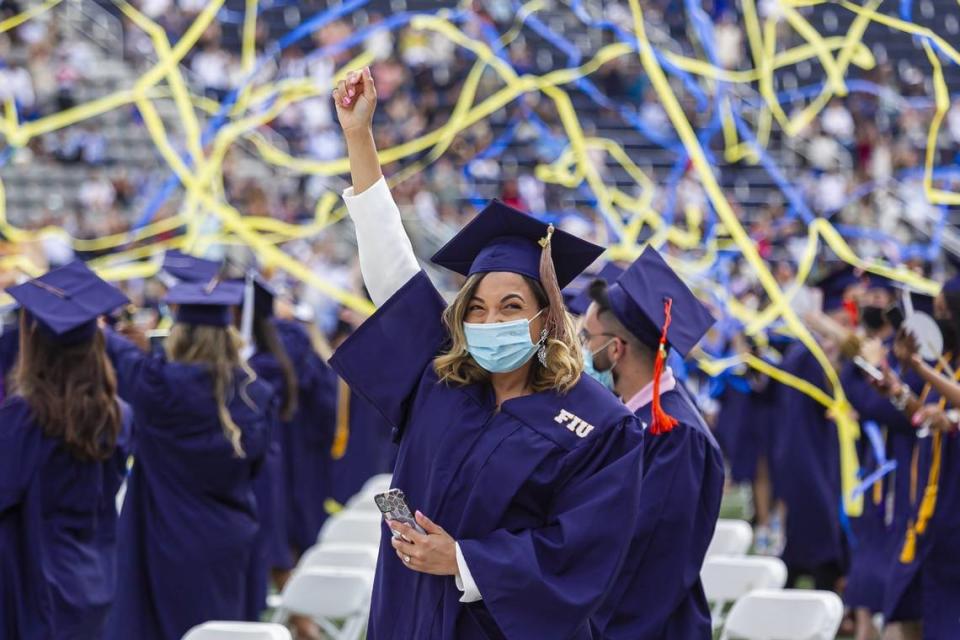Billionaire MacKenzie Scott, Bezos’ ex-wife, donates $40 million to FIU in surprise move
- Oops!Something went wrong.Please try again later.
Florida International University President Mark Rosenberg was driving down Southwest Eighth Street, one of the busiest traffic arteries in Miami, when his phone rang. The voice on the other line shocked him. So much so, he pulled off immediately near a lawn in Coral Gables and rushed to take notes on what he was hearing.
“My first thought was, ‘I’m living a dream.’ I listened and had to pinch myself,” said Rosenberg, 71. “It’s unbelievable. They just called and said, ‘You’re in.’ ”
That’s how Rosenberg, who first joined FIU in 1976 as an assistant professor of political science, went on to become state chancellor and was named FIU president in 2009, found out billionaire philanthropist and author MacKenzie Scott was donating $40 million to FIU, the single largest unrestricted gift in FIU’s 56-year history.
FIU will direct the money toward its $750 million Next Horizon campaign and invest it in student programs that promote upward mobility. With 55,000 students, FIU is one of the largest public universities in South Florida.
The gift to FIU is part of a $2.7 billion charitable spree to 286 organizations across the country that Scott, 51, and her husband, Seattle science teacher Dan Jewett, announced Tuesday.
Scott has a net worth of $53 billion, according to Forbes. She acquired most of her wealth in Amazon shares after divorcing in 2019 Jeff Bezos, 57, Amazon’s founder and CEO, and a Miami Palmetto High graduate, Class of 1982.

Scott, ranked by Forbes the third-richest woman in the world, has become known for impromptu donations to nonprofits that focus on empowering girls and women, bridging racial, religious and ethnic divides, supporting arts and cultural groups and giving to colleges and universities. In 2020, she gave away a total of $6 billion, chiefly to COVID-19 relief organizations.
As part of her latest benefaction, Scott awarded $40 million to the University of Central Florida in Orlando, the state’s largest public university with about 70,000 students.
“We are honored by Ms. Scott and Mr. Jewett’s trust and confidence in the University of Central Florida,” UCF President Alexander N. Cartwright said in a statement on the UCF website. “Their transformational gift validates the work our faculty and staff do to foster student success and we are thankful these funds will enable us to increase our impact for generations of students.”
Scott also included Broward College on her list, donating $30 million to it, The Associated Press reported.
‘University presidents dream of these kinds of moments’
Scott’s donation not only astonished FIU’s Rosenberg when he first heard about it about a month and a half ago because of its magnitude, but also because it came with no strings attached.
An unrestricted donation means the recipients can do anything they want with it. Asked how often that happens now in academia, Rosenberg said: “Rarely to almost never.”
Usually, rules apply. And those can vary significantly, from earmarking the gift to a narrow field or area of expertise, or limiting it to certain groups of students. Sometimes donors will funnel the funds exclusively toward faculty travel, or to student travel, or both, or neither.
“We only want left-handers, if you will,” Rosenberg said. “Usually the donor has a very specific purpose and motivation in mind.”
No conditions, then, is akin to finding the golden egg during an Easter egg hunt.
“University presidents dream of these kinds of moments, and most of us work hard to achieve these kinds of moments, but rarely do they happen,” he said. “So it’s an amazing development, but not for the president. It’s an amazing development for the institution, the community and the students that are going to benefit. I really feel that.”
UCF described Scott’s donation as the largest gift the university has received in its 58-year history.
FIU, founded in 1965, ranked it its second largest ever, exceeded only by that of media heir Mitchell “Micky” Wolfson, who in 1997 donated his collection of objects and the building they were housed in to FIU, which developed the Wolfsonian-FIU at 1001 Washington Ave. in Miami Beach. The museum, library and research center were valued at the time at about $75 million.
Why did MacKenzie Scott choose FIU?

Scott’s gift to FIU didn’t require a momentous meeting, a prior presentation or a years-long effort to build a close relationship.
Rather, FIU just operated and Scott noticed. Rosenberg said Scott’s team reviewed the roughly 4,000 American universities and colleges, and selected some through their own research, identifying the ones that best connected with their ideal profile.
In a Medium post breaking the news to the public, Scott criticized the disproportionate wealth gap in the U.S. and said she wanted to support groups “working in areas that have been neglected.”
“Higher education is a proven pathway to opportunity, so we looked for 2- and 4-year institutions successfully educating students who come from communities that have been chronically underserved,” she wrote.
About 85 percent of FIU students are minorities and more than 66 percent are Hispanic, according to the university.
Additionally, an analysis from Excelencia in Education, a nonprofit dedicated to helping Hispanic students succeed in higher education, recognized FIU as the top institution in the U.S. in enrolling and graduating Hispanic students with bachelor’s degrees and No. 6 in the nation in awarding engineering degrees to African Americans.
“We were aware of the fact that they were out there, but they selected us,” Rosenberg said. “And we’re honored and humbled by that selection, and we’re ready to roll our sleeves up.”
The FIU staff still has to discuss the specific details on how to allocate the resources, Rosenberg said, but all of it will go to fund initiatives like Fostering Panther Pride, which offers financial assistance and life coaching to students who were previously in foster care, and Connect4Success, which helps fund students from Miami Dade College and Broward College who transfer to FIU.
The impact will kick in as early as next January, he said.

